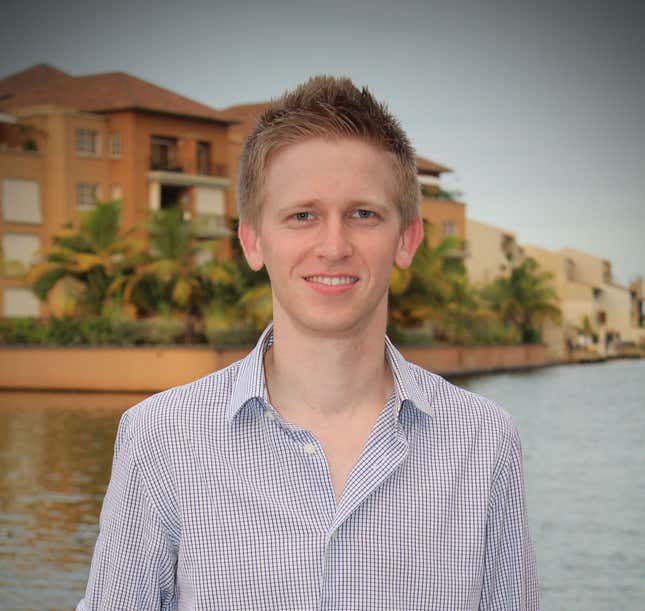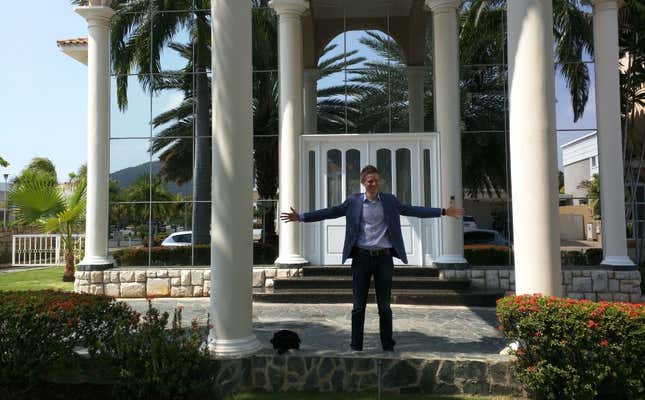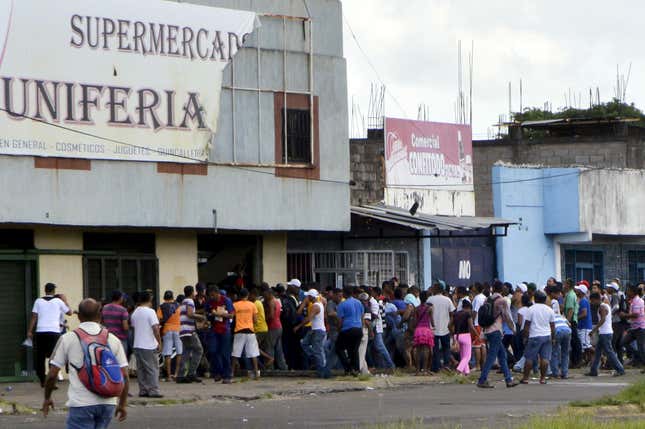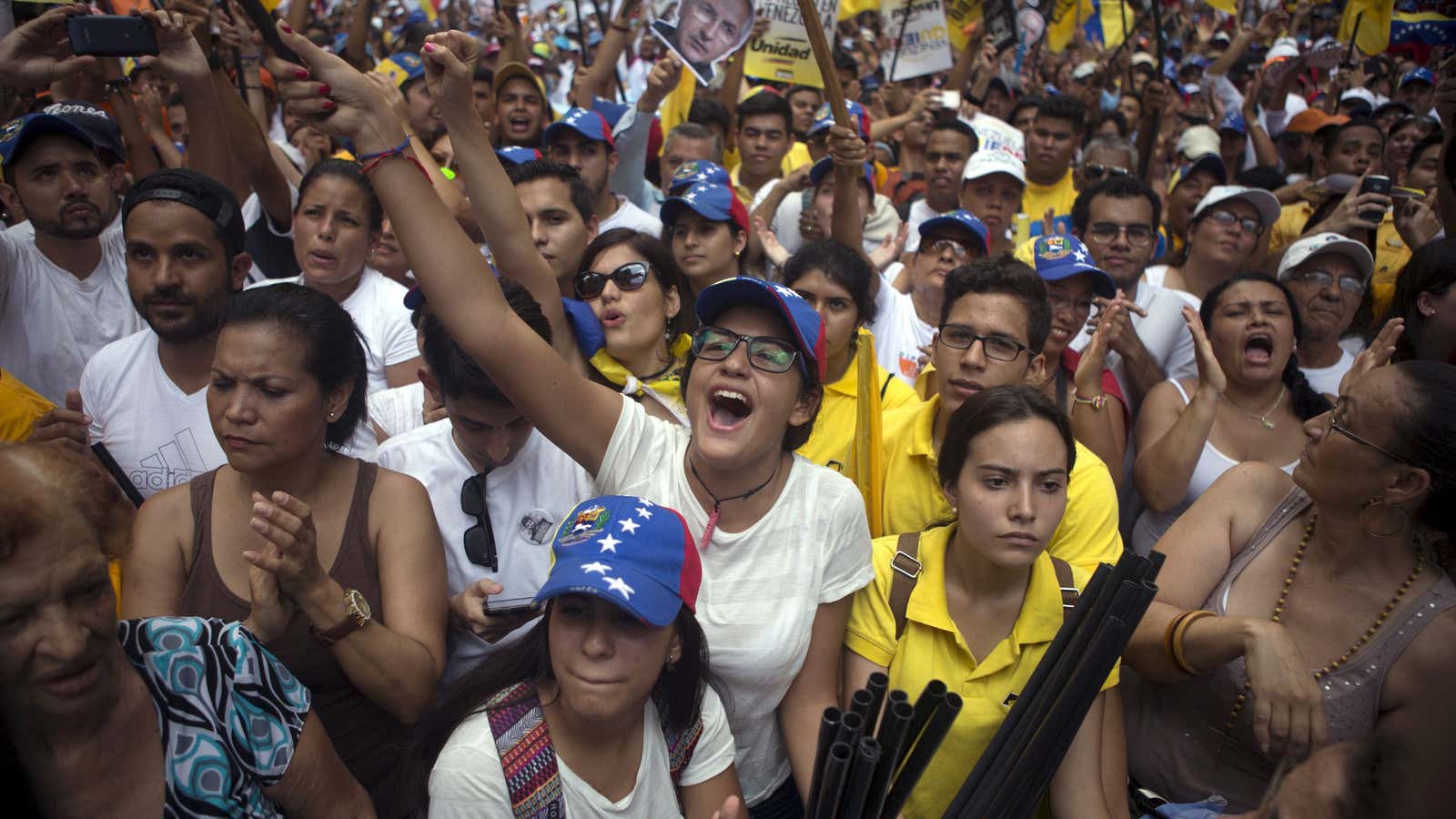“To stay in Venezuela is not the same as failure. To leave Venezuela is not the same as success.” Stephan Kaiser’s voice echoes between two walls of soaring mirrored glass. The gangly young man’s gleaming teeth, white-blonde hair and tailored suit lend him a television-ready sheen that set him apart from his audience.

In front of him, a group of twenty Chevron administrators bob their assent and straighten in their chairs. They are gathered in the atrium of an enormous mansion reserved for executive events in Puerto la Cruz, Venezuela. Chevron has hired Kaiser—who, at 28 years old, is still as fresh-faced as a college student—to motivate them.
Kaiser gathers a breath and raises his thin arms with the precision of a conductor. He shares a gleaming smile. “People think that outside Venezuela things are exactly the same—but without problems.”
“And with dollars!” A woman in a Chevron polo shirt cracks. A generous burst of laughter cuts the silence and loosens twenty sets of shoulders. The attendees grin appreciatively at each other, then fix their attention on Kaiser.
* * *
Middle-class Venezuelans could use some levity. Record-breaking violent crime and inflation have driven a stampede of emigration, separating families and friends. Those left behind can spend hours each week in lines for basic goods, watching inflation eat into their salaries each month. During the last two years, the middle class has been hit the hardest, journalist Andreína Márquez explains. The rapid change in quality of life is staggering. The result, she says: “We have become a depressed society.”
On December 6th Venezuelans will vote in the first parliamentary election since the death of Hugo Chávez, who was president from 1999 to 2013. Many expect high voter turnout, but little immediate impact on the country’s predicament. They have good reasons to doubt. Parties loyal to Chávez and his successor, Nicolás Maduro, have controlled the national assembly and presidency since 1999.
In the 2013 presidential election, Maduro claimed a razor-thin victory over Henrique Capriles amid cries of fraud. The three months of protests that followed in 2014 were brutally suppressed, leaving dozens dead. It is widely held (link in Spanish) that some of the murders were perpetrated at the hands of government-supported paramilitaries, or colectivos. Understandably, the streets have been quieter in the run-up to this year’s election, despite some outbursts of violence.
Even if the opposition wins a majority in the assembly, it’s unclear how quickly new policies could reverse Venezuela’s corruption, severe economic slump and soaring crime rates. And so, the disenchanted trudge through a “dark tunnel of cautious expectations,” writes social psychologist Tulio Hernandez.
But outside the realm of the political, a wave of positive pop culture is gaining currency with the middle class. Where rallying for reformers is no longer viable, it seems, people are drawn to magnetic ideas for creating a brighter future—from within.
* * *
“Ironically, the crisis has gone really well for us,” Kaiser shrugs on the drive to the Chevron venue. Tens of thousands have attended his motivational seminars this year; 6,000 Amway sales representatives, another 1,000 from Tupperware. He is fully booked in the weeks leading up to the election, despite tripling his speaking fees (in real terms). “Well,” he concludes, “we are selling the solutions.”
This is the first time Chevron has invited Kaiser to the mansion. He falls quiet as he scans his national identity card at the guard tower outside. We are waved inside the compound and, it seems, transported to Dubai. Palm-lined streets wind around the artificial canals where Venezuela’s 1% park their yachts. We pull up to a sand-colored colossus as Kaiser murmurs, agape, “This one looks like a mall.”

Kaiser is the son of a modest Caracas dentist, a German immigrant who lent him his unusual name, long limbs, and near-translucent pallor. Inside the Chevron mansion, he is sure to make the first joke about each of these features, comparing his skin to the marble floors with a toothy guffaw.
Chevron has an special reason for bringing Kaiser in today: the company has just laid off a lot of people, and morale among middle managers is abysmal. This is why the 20 administrators are summoned to Kaiser’s training at the Chevron mansion, which is apparently as foreign and opulent to them as it is to Kaiser. The dazzling location does not immediately lift their spirits, however. Instead, the staff shuffle in with heavy brows, as though moving through Hernandez’s tunnel of cautious expectations.
What’s the key to inspiring Venezuela’s beleaguered middle class? Kaiser’s solution is to teach them unflappable optimism no matter what their circumstances. He clicks a button to advance the projector. A photo of a Malibu sunset appears on the wall behind him, along with the title: Surf the Wave. How to be inevitably optimistic. The room quiets.
“What happens when you see a wave coming?” Kaiser enunciates. “Do you deny it? Do you insult it? In Venezuela, we have many waves. Scarcity. Inflation. Government. But it’s not very useful to complain or cry out. The only thing to do is surf these waves.”
The theme of changing one’s thought patterns is buttressed with theory, humor, movement and story. Kaiser proffers a host of positive psychology research on posture and speech. An ongoing game of “Stephan Says,” while perhaps not quite teaching participants to control their thinking, at least draws reliable roars of laughter.
Kaiser’s face turns serious, “I’d like to share with you the Law of Decisions.” The conductor’s hands rise to shoulder-height. He explains: “Your success is determined not by your conditions, but your decisions.” A slide appears with photos of J.K. Rowling, Walt Disney and Jim Carrey. “What do each of these people have in common?” Kaiser asks. “They’re all famous,” he quips. “Yes, thank you, thank you, they are all famous. But also, they were all bankrupt at least once during their life.”
“These people understood the Law of Decisions. They understood that success doesn’t depend on your conditions, but on your decisions.”
Kaiser closes to rowdy applause and tosses out some neon rubber bracelets with custom phrases: #ZEROEXCUSES, #IAMALEADER, #TAKEARISK. They cartwheel into the hands of gleeful participants, who circle their chairs and chatter long into lunch hour about how the crisis might present opportunities for them.
Chevron analyst Nesrin Oliveros is smiling brightly. “We are overloaded with work—yes. But we have to take [the layoffs] as an opportunity to develop new skills.” Senior analyst Norica Reyes nods. “I think this is excellent. In the oil industry, this theme of optimism is very important. It’s excellent,” she repeats.
How will she put what she learned today into practice? Her brow furrows. “Well, by confronting the day-to-day.”
* * *
In daily life, buoys of hope are launched against the tide of despair. A startup hub in Caracas brings in guest speakers for a public series of optimist meetups. A viral hashtag declares, irresistibly, #AquiNoSeHablaMaldeVenezuela (“Here we don’t bad-mouth Venezuela”), and its creator has launched a book and speaking tour on the power of optimism. Kaiser continues packing hotel ballrooms, and many seminar attendees say that he has helped them transform their lives by changing their outlook.
It’s easy to understand the draw of self-help and positivity when you consider the alternatives. Young optimists of means have been rallying against the government for years, but to no avail. Francisco Toro, a Venezuelan journalist, lamented in 2011 that the momentary exhilaration of pro-democracy protests during the 2000s has given way time and again to the “sting of our failure.” And as the government jails opposition activists and others are lost to assassination, fewer and fewer people are willing to risk joining their ranks.
Kaiser is unwavering in his belief that the solutions for Venezuela’s future can be found within individuals. A few months ago, he wrapped a seminar to the thundering applause of 1,300 Amway sales representatives in Ciudad Guayana. His closing line brought down the house: “You can take responsibility each day for creating a better life, a better family, a better business, and above all, a better Venezuela.”

A few weeks later, Ciudad Guayana made international headlines when it witnessed the first in a rash of deadly supermarket lootings. Reflecting on this on the morning of the Chevron seminar, I ask Kaiser if he thinks there are any exceptions to the “law” stating that one’s attitude and decisions determine one’s success. For instance, can poverty and violence defeat even the best of intentions?
“Of course not,” he says, referencing yet another successful motivational speaker who grew up in a very tough area of Caracas.
The conversation continues this way. For every challenging scenario imaginable, Kaiser can conjure a positive potential outcome. After all, he himself built a thriving business amid the world’s deepest economic recession. “It’s not about ignoring conditions. But the important thing is what you do with them. And the first decision you make is how you see your conditions.”
On the way to Kaiser’s seminar, we drive past a large crowd of people waiting in line to buy food, and past fiery red propaganda painted over cinder-block walls: “We are all Chávez.” “The unity of the people creates hope.” No one in the car makes much of what is happening on the street. The hallmarks of Venezuela’s broken promises are so omnipresent that they often seem to fade into the landscape.
We drive by the local Chevron bureau to find a demonstration (link in Spanish) taking place. On one side of the hot, diesel-perfumed road stands the Petróleos de Venezuela (PdVSA) building, cloaked in an enormous “Socialist Values” banner. On the other side of the road stands the Chevron building, closed off by laborers protesting for salaried positions. We roll by, trailed by homemade signs with “Chevron Respect the Working Class” traced in pro-Chávez red and black. The house of marble and glass waits up the road.
